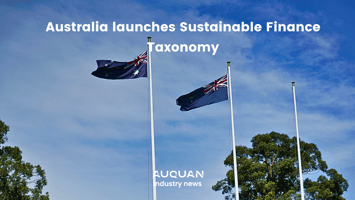The Australian Sustainable Finance Institute (ASFI) has released the Sustainable Finance Taxonomy...

The Platform on Sustainable Finance (PSF) recently published an independent report proposing to streamline sustainable finance for small-medium enterprises (SMEs). Specifically, the PSF proposed developing SME sustainable finance standards to help SMEs and their investors better voluntarily demonstrate their environmental sustainability performance.
The proposed framework by PSF is expected to be useful for private market firms, asset managers, and impact investors who want to assess and report sustainability classification more effectively to improve their investment experience.
Let’s explore the SME sustainable finance standards report released by the PSF in detail.
The report released by PSF builds on the experience of implementing a sustainability guarantee under the InvestEU program. The voluntary SME sustainable finance standard addresses the challenges faced by SMEs in reporting their sustainability performance. It allows enterprises to disclose key performance indicators related to their climate efforts to make it easier for financial institutions to assess and support them. Initially focused on climate-related sustainability, the standard is intended to expand to other environmental objectives, bridging the gap between SMEs and sustainable finance opportunities.
“Small and medium‑sized enterprises (SMEs) are pivotal to Europe’s sustainability transition, contributing over 50% of the EU’s GDP and more than 63% of enterprise CO2 and broader GHG emissions. The transition to a net zero, resilient, and environmentally sustainable economy hinges on SMEs’ ability to access the necessary financing to decarbonise, build climate‑resilience, green their operations, and develop sustainable products and services. Despite their critical role, SMEs face significant challenges in securing external financing for sustainability efforts.” — said PSF in the report announcement.
On March 27, 2025, the Platform on Sustainable Finance will present the report in a webinar.
Professionals in private markets and asset management firms use Auquan's AI agents to automate research and monitoring for deal sourcing, borrow screens and due diligence, risk monitoring, sustainability, and compliance workflows.
Using advanced AI techniques, Auquan generates material insights on any company or issuer worldwide — public or private — instantaneously, tailored for your workflow.
Let's explore how Auquan can help you and your team eliminate tedious and time-consuming manual data work and focus more on what you do best.
Each day we spotlight under-the-radar investment themes and idiosyncratic risks pulled from our intelligence engine, often involving emerging markets, supply chain issues, ESG risks, and the impact of regulatory changes.

The Australian Sustainable Finance Institute (ASFI) has released the Sustainable Finance Taxonomy...
.png?height=200&name=Image%20Cards%20for%20Blog%20Posts%20and%20Social%20Media%20(12).png)
Auquan announced new Sustainable Finance Disclosure Regulation (SFDR) Good Governance capabilities...
.jpg?height=200&name=Content%20Image%20Cards%20(5).jpg)
Verdantix, a leading analyst firm in ESG and sustainable investing, named Auquan as one of 10...
Each day we spotlight under-the-radar investment themes and idiosyncratic risks pulled from our intelligence engine, often involving emerging markets, supply chain issues, ESG risks, and the impact of regulatory changes.

15 minutes to see what’s possible when manual work disappears.
Interested in working at Auquan? Click here
The Platform on Sustainable Finance (PSF) recently published an independent report proposing to streamline sustainable finance for small-medium enterprises (SMEs). Specifically, the PSF proposed developing SME sustainable finance standards to help SMEs and their investors better voluntarily demonstrate their environmental sustainability performance.
The proposed framework by PSF is expected to be useful for private market firms, asset managers, and impact investors who want to assess and report sustainability classification more effectively to improve their investment experience.
Let’s explore the SME sustainable finance standards report released by the PSF in detail.
The report released by PSF builds on the experience of implementing a sustainability guarantee under the InvestEU program. The voluntary SME sustainable finance standard addresses the challenges faced by SMEs in reporting their sustainability performance. It allows enterprises to disclose key performance indicators related to their climate efforts to make it easier for financial institutions to assess and support them. Initially focused on climate-related sustainability, the standard is intended to expand to other environmental objectives, bridging the gap between SMEs and sustainable finance opportunities.
“Small and medium‑sized enterprises (SMEs) are pivotal to Europe’s sustainability transition, contributing over 50% of the EU’s GDP and more than 63% of enterprise CO2 and broader GHG emissions. The transition to a net zero, resilient, and environmentally sustainable economy hinges on SMEs’ ability to access the necessary financing to decarbonise, build climate‑resilience, green their operations, and develop sustainable products and services. Despite their critical role, SMEs face significant challenges in securing external financing for sustainability efforts.” — said PSF in the report announcement.
On March 27, 2025, the Platform on Sustainable Finance will present the report in a webinar.
Professionals in private markets and asset management firms use Auquan's AI agents to automate research and monitoring for deal sourcing, borrow screens and due diligence, risk monitoring, sustainability, and compliance workflows.
Using advanced AI techniques, Auquan generates material insights on any company or issuer worldwide — public or private — instantaneously, tailored for your workflow.
Let's explore how Auquan can help you and your team eliminate tedious and time-consuming manual data work and focus more on what you do best.
Each day we spotlight under-the-radar investment themes and idiosyncratic risks pulled from our intelligence engine, often involving emerging markets, supply chain issues, ESG risks, and the impact of regulatory changes.

The Australian Sustainable Finance Institute (ASFI) has released the Sustainable Finance Taxonomy...
.png?height=200&name=Image%20Cards%20for%20Blog%20Posts%20and%20Social%20Media%20(12).png)
Auquan announced new Sustainable Finance Disclosure Regulation (SFDR) Good Governance capabilities...
.jpg?height=200&name=Content%20Image%20Cards%20(5).jpg)
Verdantix, a leading analyst firm in ESG and sustainable investing, named Auquan as one of 10...
15 minutes to see what’s possible when manual work disappears.
Interested in working at Auquan? Click here
